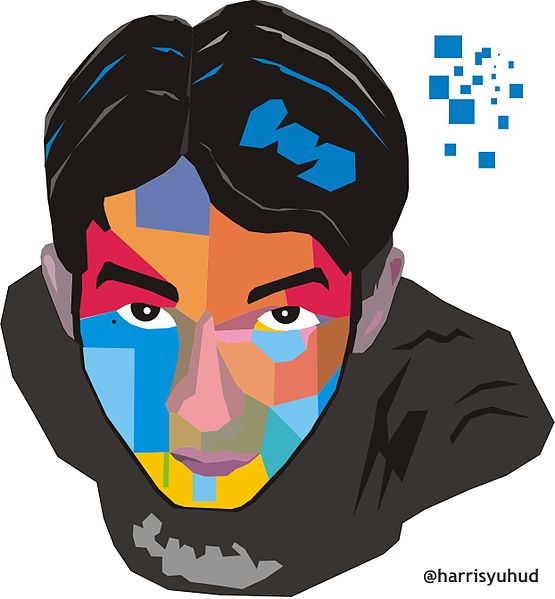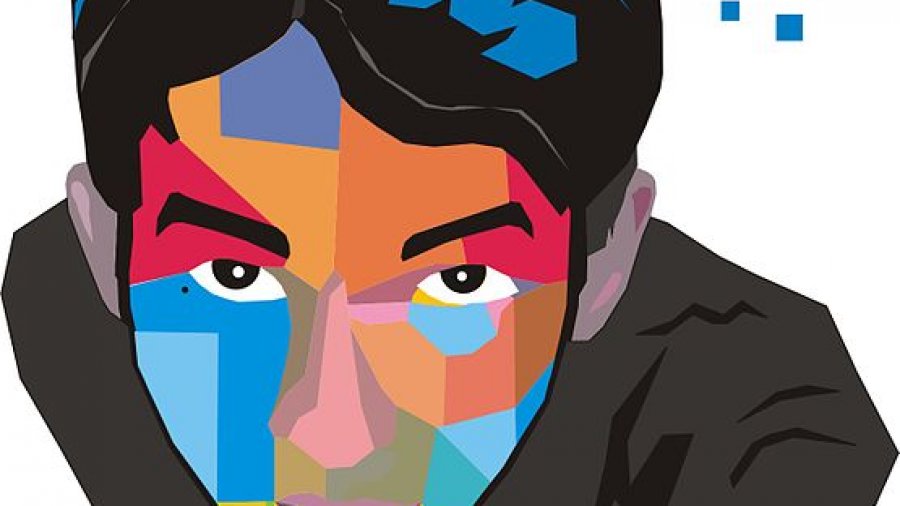I was thinking about Banksy the other day. You know of Banksy, right?
He’s that notorious, enigmatic England-based serial street artist. He’s produced countless iconic works of satirical graffiti, and his art often contains subversive anti-capitalist or anti-establishment messages. He’s also a writer, painter, and film director (his documentary, Exit Through the Gift Shop, is worth checking out).
Oh, and here’s the kicker—no one knows who he is. After more than two decades of work and despite plenty of speculation, he’s (or she’s) managed to remain anonymous. But hopefully you already knew most of that. Anyway, I was thinking about Banksy because it occurred to me recently that people might live their lives profoundly differently if no one knew who they were.

Art by Harisyuhud. Photo Credit: Wiki Commons
“Think of Your Reputation, Son!”
From an early age, most of us are conditioned to believe that external validation is of unspeakable importance in our lives. We internalize a sense of needing to meet someone else’s metric of value because we’re raised within societal structures that constantly evaluate us via exams, performance reports, quality checks, etc. Beyond that, in American society it’s common practice to judge the ever-living fuck out of people based upon what they do for work, what kind of car they drive, where they live, where they went to school, who they know, what they enjoy doing, who they like to fuck, what color their skin is, whether they have a penis or vagina or something in-between, etc.
So, when most of us begin to consider what we might like to “be” (as if we have to be one thing) when we “grow up” (whatever that means), our ideas are (consciously or, maybe more often, unconsciously) enormously restricted by our understanding of what will be perceived as successful, uncontroversial, and clean-cut. Whether we’re aware of this or not, most of us tend to mold our future plans partially or largely in terms of what will impress others, what will make Mom and Dad proud, and what will convey the image that we are living squeaky-clean, well-adjusted, “upstanding” lives.
And even though the above situation tends to massively restrict our ability to do anything original, unorthodox, adventurous, and/or self-expressive, most people don’t question it or say to hell with it. Some even seem gung-ho about it—literally psyched to spend the majority of their waking hours doing something primarily to fulfill the expectations of other people.
Beyond external validation, there are certainly other factors that compel people to spend much of their time living up to someone else’s idea of who they should be. The main thing that comes to mind is economic pressure. With enormous income inequality worldwide and hundreds of millions or billions of people living in poverty or close to it, many people hardly have a choice (or would never dream up the idea that they do because they’re so focused on finding food for themselves and their families) but to take whatever job they can find and make their boss’ dreams a reality instead of their own. Even among people who aren’t poor, money and a desire for financial security (and loads of extraneous shit to try to signal wealth and power [this goes back to seeking external validation]) still play a colossal role in compelling people take jobs they don’t really care about and spend most of their time doing things that some third party wants them to do (and feeling discontented about it—one problem money can’t fix).
Anonymity Thought Experiment
The philosopher Alan Watts had a simple thought experiment for helping young people determine what to do with their lives: he just asked them to ponder the question, “What would you do if money were no object?” By removing economic consideration from their visions of the future, young people were supposedly able to gain clarity on which activities really moved and captivated them.
I love this idea, but I don’t think Alan (bless his kaleidoscopic mind) went far enough, in that removing money from the equation doesn’t remove all consideration of external validation. I would argue that if one wants to use a thought experiment to consider one’s deepest feelings about what one would like to do, one needs to consider another question, in addition to Watts’ original one:
How would you live if no one knew you?
Whereas Alan’s question considers a scenario that does exist for many people (i.e. being so rich that money is not a concern in any undertaking), this question is not meant to describe a real-life scenario (excepting the rare hermit who is totally off the map). Even Banksy, an “anonymous” artist, has millions of people who know who he is, or at least, what he’s done. Of course people will always know you.
The question is purely hypothetical, but I think it’s interesting to consider (in conjunction with Watts’ money question). Because if everything you did was completely anonymous, presumably external validation would never be a factor in your motivation. And when external validation is removed from the equation, your ideas about how you’d live your life might change dramatically. In the absence of a need for external validation, your motivation for action would likely shift toward something much more intrinsically determined. Intrinsic motivation refers to doing things for the love of the thing, or because it just “feel right,” or because of the joy it brings you, or because it just seems to be “your thing.”
Based on what you imagine when you think about these two questions, you can come to understand a lot about the extent to which your course in life is being influenced by money and the wills of other people. So, yeah, maybe marinate on it for a while. And if you realize that you would live in a considerably different way, or pursue something you’ve often dreamt of doing, ask yourself why it’s totally unfeasible to just go do that. It might be that you really are restricted by a need to pay off debts or provide for your family, but it might also be the case that you’re afraid and have been totally conditioned to see “living as a good life” as being inextricable from impressing people and earning a handsome salary.
Do Your Thing
I am not suggesting that we should all drop everything and start living our lives in the most bohemian manner imaginable, with no regard for money or the opinions of others (though if you really want to go do that, fucking do it [but probably don’t hurt anyone]). I think that would be ill-suited and nearly impossible for most.
I’m just positing that reflecting on this question can provide clarity/perspective on why you’re living your life as you are, and whether or not, somewhere deep-down, you wish you were living it totally differently. If you find that this is the case, it’s completely up to you whether to act on the realization or not, though I have a hard time imagining how not acting on it at all wouldn’t result in some feelings of dissonance and discontentment. Even if you simply can’t quit your day job, I would argue that it’s possible for the vast majority of people to carve out a few hours a week to begin practicing/working on the projects or hobbies that really interest them.
Ultimately, it seems to me that living purely for external validation results in constant insecurity (“what if they don’t like me?”; “what if they laugh at me?”; etc.), excessive self-consciousness, and an unhealthy need for attention. Conversely, living for intrinsic joy and seeing life as an opportunity to express yourself and “do your thing” in the way that only you can seems to make one a more content, self-assured, colorful, and courageous person. And to quote that wily poet Dr. Seuss: “Those who mind don’t matter, and those who matter don’t mind.”
In sum, we might do well to reflect on these questions from time to time—to use them as tools for gaining insight into what the hell we really ought to be doing with all of our time on this planet and how we might live in way that is in harmony with our deep-down us-ness.
“A lot of mothers will do anything for their children, except let them be themselves.”
Banksy
P.S. If this titillated your mental muscle in all the right ways, check out the ways to grab free updates.
About Jordan Bates
Jordan Bates is a Lover of God, healer, mentor of leaders, writer, and music maker. The best way to keep up with his work is to join nearly 7,000 people who read his Substack newsletter.





Jordan, As always, great post! I’ve actually had the opportunity to live anonymously a few times in my life and found it to be incredibly liberating. Most notably, when I moved to Los Angeles after graduating college and didn’t know a single person, I found out a LOT about my motivations. I discovered that the way I dressed, the music I listened to, and even what activities I spent my time on were VERY motivated by what others expected me to do. I tried on different ways of living and, although I’m hardly radical, stepped into situations I’d always dreamed… Read more »
Derick, man, thank you for the praise and for another insightful and enriching comment. I’m loving your thoughts and feedback on what I’m writing. When I moved to Lincoln, Nebraska for college, I had an experience similar to what you describe when you moved to Los Angeles. I knew no one, and it was very eye-opening for me, as I too discovered the myriad ways in which I’d been living and doing things purely because of the pressure I felt to conform to what others did or wanted. I’ve also tried on different hobbies, lifestyles, and situations, and for me,… Read more »
Jordan, This is an incredible post man! And thank you Derick for sharing it on Facebook. I’ve been guilty of living the majority of my life with a desire to gain approval and validation from my family and friends. The first opportunity I gave myself to live anonymously was a few years ago when I spent 2 weeks in Spain. Then again last year when I spent a couple weeks in Peru. And again this year, when I spent the month of January traveling throughout SE Asia. Each experience of truly living anonymously in a foreign land chipped away at… Read more »
Peter, Dude, thank you so much for taking the time to write your comment. I truly appreciate the praise for the article, and I’m glad it resonated with you. I can relate completely with what you’re saying about the power of traveling abroad. I actually wrote a long post about why traveling abroad is the best decision one can make (read that one here if you’re interested: http://www.refinethemind.com/traveling-abroad-best-decision/). It is just so damn liberating to stop caring about what’s expected of us and start being unapologetically ourselves. I’m glad to hear of the progress you’ve made and wish you all… Read more »
Wonderful question and explanation, and I thank you for it! I hope I will continue to consider this, as my life continues to unfold. As I was thinking about this just now (first reading)… I was talking out loud with myself about this/these questions… and I wondered… within this “rule” of not knowing anyone, could I still know that my work/actions/choices helped to make others happy? Even if they did not know me or know it was me who shared the photos, words, songs, etc? Could I know that I made a positive difference in someone’s outlook or day? Or….… Read more »
Kris, You raise a really interesting hypothetical question here — if people don’t know who we are, but we still know that we made them smile or brightened their day, and that makes us feel good, are we still living for external validation? This is interesting because there is still an external stimulus — people feeling good — that makes us feel good. HOWEVER, I think the reason we’d feel good would be because we’ve come to value helping other people, which is a selfless way to live. Thus, if the warmth we feel comes from our knowledge that we… Read more »
Well written, Jordan. Balanced, thought provoking. LIke the hyperlinks. 1) Living as a Nony Mouse. I enjoy company immensely, chatting, swopping ideas, BUT I enjoy prolonged solitude equally. In the 1990’s I headed off on my little ownsome, maybe somewhat embittered and frustrated, definitely disillusioned, to the Orient, and ended up as the only White Caucasian on a Taiwanese fishing boat, crewed by Taiwanese, Chinese, Indonesians, and Philippinos. I learned a lot of Chinese, including swear words, and they learned a little bit of English. A warming cultural experience that was initially very, very lonely, morphed into a mind broadening… Read more »
Francis, I too love company and wouldn’t want to live without the time that I spend with other people. The anonymity experiment is useful for introspection, but I certainly wouldn’t want to drift through the world unable to know another soul. Your experiences in Asia sound incredible. I can relate (possibly) to the loneliness you described. Glad to hear that you eventually felt it was a beneficial and broadening period of your life. I really like your point about money. I too view money as a means to an end, whereas so many people seem to view it (and all… Read more »